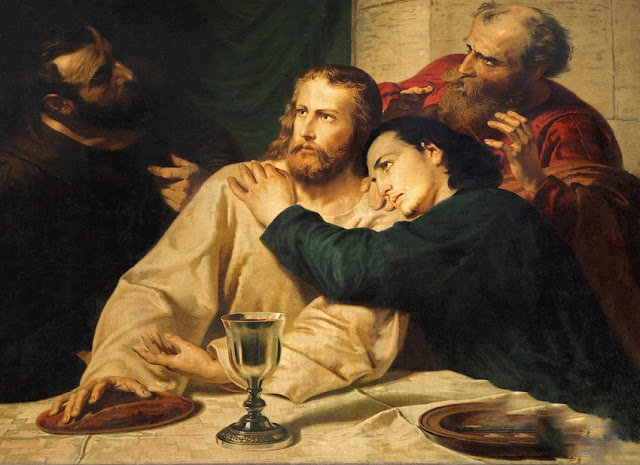THE HOLY FAMILY
OF JESUS, MARY AND JOSEPH
December 29, 2024 – Dell Rapids
Sir 3:2-6, 12-14
Col 3:12-21
Lk 2:41-52
Praised be
Jesus Christ!
Today, on this
year’s Holy Family Sunday, we have a lot to think about and to pray over, because
even here in God’s country our world is not exactly in order when it comes to
family life. The ideal of the family of Jesus, Mary and Joseph seems
unattainable as a model for our families. That must not be so. I would insist
that Holy Family Sunday is a time to pray for Catholic families and for the grace
of the Lord’s aid in favor of our little church, the normal family, the
building block basic to the greater unity which is the Church for the sake of
the life of the world.
Sadly however, these days Jesus, Mary
and Joseph at Nazareth, who should be our hope and inspiration, indeed do seem
out of reach as a model. In our world, the classic mom, dad, and children
family of my childhood has become somewhat of the exception to the rule. Sadly,
we know much more today about the struggles of single parent homes. Divorce has
become way too common, but even before we get to that point, young people seem hesitant
to marry. People will tell you that the reason young people are not marrying in
the Church these days and are not founding families is because everything has
become so expensive. They say that buying a home since COVID is out of the
question for most young folks; renting has become the norm. As odd as it seems,
the couple’s second salary hardly seems to cover the cost of childcare. You’ll
hear people say that they need two sources of income just to get by, and that they
can’t afford children because a big van or SUV is too expensive and with all
those car seats it is just too much to deal with. Lots of years ago I can remember
Mom saying that no couple can raise more than 4 children (I am the oldest of
8), after the fourth she said wisely and proudly that the older children need
to help out with the younger children. Granted, seat belts are important, and
car seats make sense, but we used to travel all together in the family car with
a younger child on each older child’s lap, so we had a double row in the back
seat of a regular 4 door sedan, and that being not a new car but a very used vehicle.
Even so I had the impression that we wanted for nothing and were very happy.
Grandma would come
and visit for about two weeks at some point each winter and she spent a goodly
part of her stay patching jeans, sewing on buttons, darning socks, maybe
putting a new zipper on some of the things which had piled up in the mending
basket since her last visit. I felt loved and cared for and had no
understanding of what it meant to go hungry, even though soft drinks and snacks
were a rare occurrence, maybe for a little family New Years party. My point
would be that family could not and still should not be factored around
something like buying power for luxury items. Think about it!
Today is Holy
Family Sunday! What is it all about? No doubt many people would just assume that
this would be the day to talk about behavior issues. They might even quote
today’s passage from Luke Chapter 2 and say: see, that’s the way you should
behave, obedient to your Mary and Joseph like Jesus was at 12 years of age. The
boy Savior speaks up: “Why were you looking for me? Did
you not know that I must be in my Father’s house?” But they did not
understand what he said to them. He went down with them
and came to Nazareth and was obedient to them; and his mother kept all
these things in her heart. And Jesus advanced in wisdom and age and favor before
God and man.
Even at age 12
the boy Jesus, the Lord Jesus, even though He knew better than Mary and Joseph just
Who He was and what He was about (“Why were you looking for me? Did you not
know that I must be in my Father’s house?”). Even so, He respected the
order of things. He respected family. He didn’t stay behind in Jerusalem at age
12 when Joseph and Mary came looking for Him. “He went down with them and came to Nazareth
and was obedient to them…”
Could Jesus not
have started His public ministry at age 12 instead of waiting until age 30? I
suppose so, even if it would have been a bit odd. Whatever the Lord Jesus would
have done, He would have done rightly, but we have been gifted with the message
and mystery of His humble but terribly normal life at Nazareth a pattern for
family life, for mutual respect among members of family and of course of
obedience.
Holy Family
Sunday should be that time, and rightly so in the midst of our celebration of
the birth of Christ, when we come to appreciate just what is true happiness. True
happiness in life has something to do with being grateful for things as they
are and treasuring each other at home.
On this Sunday,
pray for the happiness of your own family, pray for healing for broken families,
and pray that young people might not shy away from marriage and family, from
giving the gift of life and the only real happiness which matters.
Praised by Jesus Christ!










